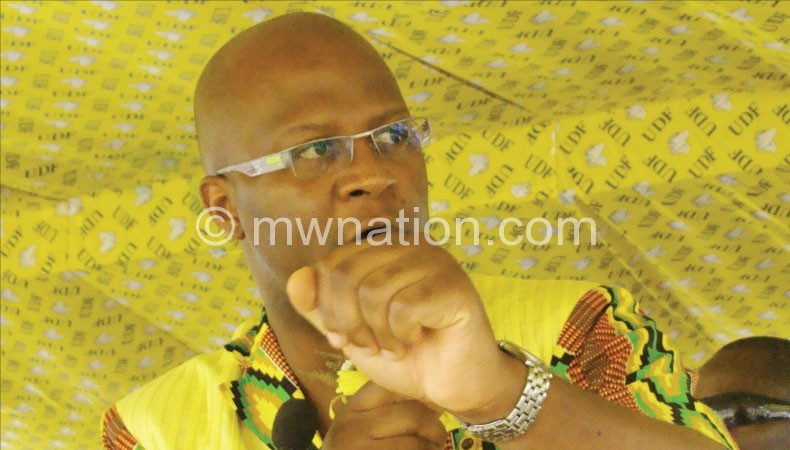Atupele burns his political capital
Atupele Muluzi is finished without DPP because UDF is finished,” declares Sam Mpasu, a veteran politician who was one of the earliest members of the United Democratic Front (UDF) and long-time Cabinet minister in the Bakili Muluzi administration.
This fact, asserts Mpasu—who left UDF several months ago to co-found the New Labour Party (NLP)—explains the current chaos in UDF as Atupele fails to define the party’s strategic direction after an embarrassing electoral loss that put him in a survival mode.

And when the political future of a hitherto rising star depends on a party that was once your father’s arch-enemy, then Atupele should know that he has burned the little political capital he had built in the run-up to the May 20 2014 Tripartite Elections.
The day Atupele accepted to be Minister of Natural Resources, Energy and Mining in the triumphant Peter Mutharika administration, was the day the final nail was thrust into the UDF coffin.
His failure to explain with a degree of clarity what kind of relationship he or his party has with the ruling Democratic Progressive Party (DPP) and what is in it for his party has opened up Atupele to accusations of using UDF to further his personal interests—whatever those might be for someone who, less than a year ago, wanted to be State president.
Love triangle
Atupele’s conflicting search for love in all the wrong places in both sides of the aisle in Parliament smacks of either indecisiveness or playing both sides—a thin line that will earn him no favours from either side, only deep mistrust of him.
“UDF has been deceiving itself, its members and Malawians in general that it is not in government. Tell me, can the president of the UDF be in Cabinet and his party in opposition?” wonders Mpasu, a former speaker of Parliament.
He added: “By finally pushing for its members of Parliament [MPs] to be on government benches, UDF is simply admitting what they have been dodging—that the party has been dragged into a governing alliance whose terms are only understood by one person: Atupele.”
But if it is the question of Atupele trying to survive in the face of a fast fading UDF, then can he really be a productive partner for DPP, given his fast fading political capital and now a history of jumping in bed with the ruling elite before unceremoniously bolting?
Atupele has in the past demonstrated that he is fickle and can easily turn against his senior partners.

In 2012, he snuggled onto People’s Party (PP) bosom when the then president Joyce Banda appointed him minister of Economic Planning and Development.
But when PP’s heavy weights such as Uladi Mussa challenged him with harsh criticism on the back of rumours that he might team up with JB as her running mate in the May 20 2014 Tripartite Elections, he recoiled and ran to papa. Thus, Atupele resigned from Cabinet, citing intolerance in PP.
And no sooner had he handed over the ministerial Mercedes Benz than Atupele started castigating the Banda administration and their policies such as the Economic Recovery Plan (ERP) whose formulation he largely spearheaded.
In that context, Atupele’s political power did not survive in PP, but being a Muluzi, he eventually found his way into the party leadership, becoming the UDF nominee and later candidate for president in a race in which he emerged a distant fourth.
That loss left the party with fewer MPs than ever before—a highly diminished political base.
Fall of UDF
Where did things start going wrong?
To be fair to Atupele, the genesis of UDF’s problems date back to around 2003 when his father, former president Muluzi, started agitating for a third term and later open terms, which flopped in Parliament where legislators narrowly rejected it.
What broke the camel’s back was Muluzi’s attitude that if he could not continue enjoying the presidency, no one else in the party would.
He thus proceeded to court and eventually plucked a failed politician at the time—Bingu wa Mutharika—from political oblivion, first installing him as deputy governor of the Reserve Bank of Malawi (RBM) then Economic Planning and Development minister and, before the party could even scream UUUUUUUUUU! Mutharika was the UDF torchbearer in 2004.
It was during the third/open terms struggle and Muluzi’s irresponsible succession handling that the party started disintegrating, with senior figures leaving the party after falling out with Muluzi over his hunger to extend his presidency beyond the constitutional limit of two five-year terms and refusing to entertain healthy competition in the party for the top leadership.
For example, then State vice-president Justin Malewezi resigned from his position a few months before the end of the presidential term and went ahead to launch a failed bid in May 2004 as an independent presidential candidate.
Party vice-president Aleke Banda—one of the few voices of reason in UDF—also left the party in disgust.
He later formed People’s Progressive Movement (PPM), which became a force to reckon with, though to a smaller extent.
Party heavy weight Brown Mpinganjira left for the same reasons to form his National Democratic Alliance (NDA), which chipped away at the UDF support, especially in the Lhomwe Belt where he was influential.
Shire Valley heavy weight Harry Thomson also quit the party; hence, the party lost a fairly respected figure among the Senas. Of the 50 odd political parties currently registered in Malawi, most of them were formed by people who were frustrated out of the UDF as the values and principles around which it was built were iced.
Thus, UDF, as an entity and a brand was irreparably bruised thanks to breakaways, each of whom took away tiny bits of the UDF, leaving a shell that lost its form.
While the UDF narrowly won the 2004 presidential election with just about a third of the vote—a very narrow margin compared to its 1999 sweep—the party lost its soul and its heart, which Muluzi wrenched out of its chest by spitting at intra-party democracy.
That loss was reflected in the parliamentary haemorrhage, which has been declining sharply ever since, winning just 49 parliamentary seats in 2004 from 91 in 1999.
The figures drastically fell in subsequent elections when it won just 16 seats in 2009 and now has 14 House representatives.
Like father like son?
With Atupele apparently continuing with his father’s brand of party affairs management of “UDF is Muluzi and Muluzi is UDF” as Mpasu puts it, the party is eroding like the senior Muluzi’s own curtain analogy. UDF yikuthangatimakatani.
Indeed, there is so much fear among UDF MPs that no one dares to cross the Muluzis, who are regarded as the godfathers of UDF politics.
During interviews with The Nation last week, most UDF MPs said their conviction is that joining the DPP government is a bad idea, but would still follow the party line for fear of being systematically annihilated by the party leadership, which still has some influence in certain parts of the Eastern Region.
“I am in Parliament at the mercy of the party because in my area, the people like the UDF. I have no choice, but to follow what the party decides, whether good or bad, because if I am expelled, it means I am finished politically,” said one MP, adding that it is now a battle between conscience and loyalty.
That deficit of intra-party democracy that climaxed in 2003/04 and which sparked the UDF’s sharp decline is the same that is now finishing up the hatchet job of wiping the party off the country’s political map, which Atupele’s leadership has miserably failed to arrest.
In fact, instead of saving the sinking ship that is UDF, the youthful captain was the first to abandon it when it most needed navigation prowess in the face of a sobering electoral defeat.
Political analyst Mustafa Hussein agrees that such disagreements between the UDF leadership and its legislators show the extent to which intra-party democracy is deficient in the political grouping.
Another analyst, Blessings Chinsinga, also observed that when political parties decide on something without consultation, it shows that something is wrong.

“When party leaders can make decisions on their own without the blessings of either their legislators or supporters, it shows that democracy is lacking within the party. This is a trend that needs to be checked,” said Chinsinga, an associate professor of political science at the University of Malawi’s Chancellor College (Chanco) in Zomba.
For political scientist Joseph Chunga, also of Chanco, Atupele has put personal interest above party and national interests and, in the process digging the UDF’s political grave and soiling his bed that he may not be comfortable laying on in future.
Efforts to talk to Atupele have proved futile, as the UDF leader has consistently avoided discussing his party’s ongoing identity crisis and where he wants to take it.
What’s the plan?
The big question now is what game DPP is playing and whether it indeed believes that Atupele on one hand and UDF on the other are strong enough strategic assets going forward.
Mpasu’s startling claim during an interview on Monday, while sounding outrageous, could explain why regional politics are here to stay in Malawi—and why DPP is chasing the not so coy Atupele.
Claimed Mpasu: “There have been some people in the South who have been pushing, and appear to be succeeding, that all parties with their base in the South should gang up to prevent the Centre and North wresting away power. If you see how UDF is secretly attaching itself to DPP, you will begin to see the outlines of the grand strategy I am talking about.”
Mpasu denounced the entrenchment of regional politics, saying it is bad for democracy, terrible for the country, ghastly for national cohesion and an instigation of polarisation that could be dangerously divisive and politically explosive.
And Atupele may just have traded his political capital for, well, nothing.





